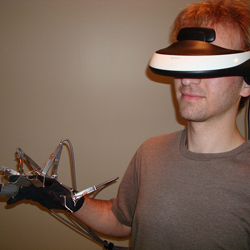
Is this region on the brink of becoming a national leader in high-tech R&D?
When you talk about high-tech jobs, most people don’t think of Greater Peoria as a hub. But perhaps that mentality is changing. In December, Engine Advocacy, a West Coast technology policy group, ranked the Peoria MSA third in the nation on its list of the “Top 25 Metros for High-Tech Employment Growth from 2010-2011.”
The report, entitled “Technology Works,” calls out organizations like the Peoria Area Chamber of Commerce and Peoria NEXT for embracing the high-tech industry and encouraging the region to recognize the economic benefits it brings. Engine Advocacy reports that high-tech job growth has remained strong over the last decade, and that trend is expected to continue. It’s anticipated that the demand for high-tech workers will surpass demand for workers in other sectors, so it’s important for Greater Peoria to continue embracing the high-tech industry and working to create a more cordial business climate for it.
NEXT Medical
And Peoria NEXT is doing just that. A year ago, the organization went through a realignment process to better position itself to attract technology commercialization opportunities by focusing its resources and energy on four main areas of concentration: medical, energy, food products/safety and manufacturing. Peoria NEXT CEO Grant Brewen says that the organization will first focus on “NEXT Medical,” as healthcare is the region’s fastest-growing industry and Greater Peoria already has a cutting-edge medical infrastructure that encourages growth. “The focus of ‘NEXT Medical’ is to generate funding to sponsor and manage research in the areas of cancer biology, health informatics, medical education and medical device development,” says Brewen. “With vision that extends far outside the laboratory, ‘NEXT Medical’ can aggregate funding from both public and private sources, develop research projects involving multiple institutions, and actively manage their funding and accountability.”
In line with that vision, Peoria NEXT awarded a $50,000 research grant in December to VirtuSense Technologies (VST), a Bradley University spin-off company working to develop technologies to improve medical training and skill evaluation. VST is collaborating with regional emergency physicians and others in the medical field to develop this breakthrough technology.
VST Chief Technology Officer Deepak Gaddipati explains that the grant will enable his team to continue researching ways to develop cost-effective systems to improve simulators used for training medical personnel. “We can work towards developing components for an augmented reality-based surgical training system that combines virtual patient simulation with trainee skill evaluation capabilities,” he says. One example utilizes disposable synthetic tissue, allowing medical trainees to perform surgical procedures while receiving real-time analysis of their actions. A VST palpation simulator utilizes a heads-up display for the operator to visualize a 3D scene. Under this scenario, trainees can experience the nuances of real-life surgery before operating on a patient.
Next-Generation Devices
With significant experience developing sensors for force- and motion-sensing applications, VST has developed several low-cost sensor technologies over the last three years that can be used as a starting point for the development of next-generation medical training simulators. A VST tracking system follows the motion of the operator’s fingers in real time, while a real-time FEA (Finite Element Analysis) uses this information to calculate the forces that each finger of the operator’s hand should feel. This provides haptic feedback to the user while performing palpation of a virtual patient.
In addition to the medical simulation, VST is working on two product platforms for the rehab industry, which will help providers measure their outcomes with objective metrics. The technology is currently being tested at several local rehab centers and has an anticipated release as a commercial medical device in the fourth quarter of 2013.
As a small business formed to develop low-cost simulation technology, VST’s foundational business objectives include the development and commercialization of medical simulation-based technology. The company has strong R&D capabilities in medical procedures, advanced sensors, simulation and objective evaluation systems. In addition to successfully developing new concepts with public and private-sector commercial potential, VST is experienced in transitioning R&D concepts from the laboratory to commercial-scale hardware and software systems. Examples include a wireless tactile pressure sensor glove and motion-tracking equipment that is currently in beta testing. R&D, engineering and software systems design, testing and evaluation (T&E), and fabrication are performed in-house using VST’s multidisciplinary staff. Its small size guarantees agility, permitting high-intensity efforts to be carried out in rapid succession. iBi
Renee Charles is director of media relations for The Heartland Partnership. She can be reached at (309) 495-5905 or rcharles@h-p.org.

